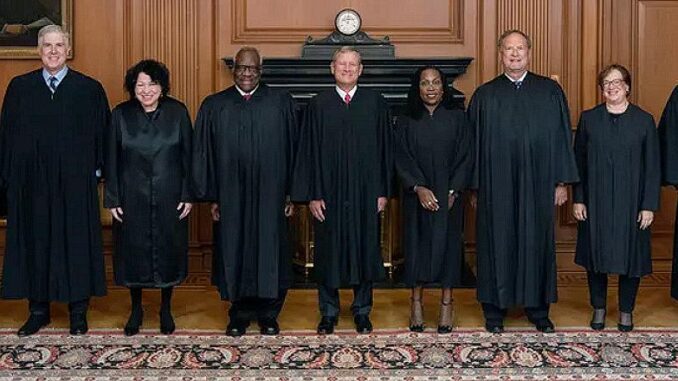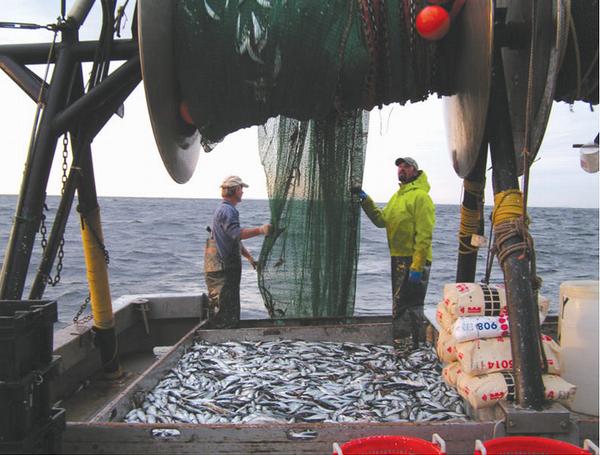
WASHINGTON, DC, July 1, 2024 (ENS) – The U.S. Supreme Court’s decision today in favor of Corner Post, Inc., a truckstop in rural North Dakota, and other rulings issued last week, alter the statute of limitations and other rules for challenging agency actions, threatening the stability of the laws that provide the United States with protections from the unchecked power of corporations such as polluting industries.
The case, Corner Post, Inc. v. Board of Governors of the Federal Reserve System, was argued February 20, 2024 and the decision was issued today.
Before today’s ruling, under the Administrative Procedure Act, APA, when a federal agency issued a regulation, parties had six years to challenge it. After that, the regulation was considered settled, and Americans could depend on its protections.
The Supreme Court decided the question of whether the APA right of action first accrues when the plaintiff is harmed or upon the final agency action, such as final approval of a rule. Under the newly released Supreme Court decision, the time to sue starts when a challenger is first harmed by a rule, so all businesses have to do is create a new corporation if they want to challenge old rules.
Corner Post, a truckstop and convenience store in Watford City, North Dakota, was incorporated in 2017, and it opened for business in 2018. Like most merchants, Corner Post accepts debit cards as a form of payment. While convenient for customers, debit cards are costly for merchants. Every transaction requires them to pay an “interchange fee” to the bank that issued the card.

The amount of the fee is set by the payment networks, like Visa and Mastercard, that process the transactions.
In 2010, Congress tasked the Federal Reserve Board with making sure that interchange fees were “reasonable and proportional to the cost incurred by the issuer with respect to the transaction.”
Discharging this duty, in 2011 the Board published Regulation II, which sets a maximum interchange fee of $0.21 per transaction plus .05% of the transaction’s value.
In 2021, Corner Post joined a suit brought against the Board under the Administrative Procedure Act, APA. The complaint challenged Regulation II on the ground that it allows higher interchange fees than
the statute permits. Corner Post argued that the Board’s 21-cent fee cap is unreasonably high and is therefore arbitrary and capricious under the APA.
If the limitations period started in 2011 with final agency action, it expired before Corner Post even existed. But, if the limitations period started in 2018 when Corner Post first was injured, the Federal Reserve’s 2011 rule is vulnerable to suit even after the passage of six years.
In the Supreme Court’s majority opinion, Justice Amy Coney Barrett wrote, “The default statute of limitations for suits against the United States requires “the complaint [to be] filed within six years after the right of action first accrues.” The law to which she refers is 28 U. S. C. §2401(a). “We must decide when a claim brought under the Administrative Procedure Act ‘accrues’ for purposes of this provision.”
“The answer is straightforward,” Barrett states. “A claim accrues when the plaintiff has the right to assert it in court – and in the case of the APA, that is when the plaintiff is injured by final agency action.”
In 2021, Corner Post joined a suit brought against the Board under the Administrative Procedure Act. The complaint challenged Regulation II because that it allows higher interchange fees than the statute permits. The District Court dismissed the suit as timebarred under 28 U. S. C. §2401(a), the default six-year statute of limitations applicable to suits against the United States.
Composed of judges affiliated with the Republican party, the Eighth Circuit Court of Appeals in Minneapolis, Minnesota affirmed the lower court’s dismissal.
But in its ruling the Supreme Court held that, “An APA claim does not accrue for purposes of §2401(a)’s 6-year statute of limitations until the plaintiff is injured by final agency action.”
The court split six to three. Chief Justice John Roberts, and Justices Alito, Gorsuch, Kavanaugh and Thomas concurred with Justice Barrett in the majority opinion.
The newest member of the Supreme Court, Justice Katanji Brown Jackson filed a dissenting opinion, in which Justices Sotomayor and Kagan joined.
Justice Brown Jackson predicts chaos in the federal government as the result of this and other recent rulings, writing, “At the end of a momentous Term, this much is clear: The tsunami of lawsuits against agencies that the Court’s holdings in this case and Loper Bright have authorized has the potential to devastate the functioning of the Federal Government.”
“Even more to the present point,” writes Brown Jackson, “that result simply cannot be what Congress intended when it enacted legislation that stood up and funded federal agencies and vested them with authority to set the ground rules for the individuals and entities that participate in the our economy and our society. It is utterly inconceivable that §2401(a)’s statute of limitations was meant to permit fresh attacks on settled regulations from all new comers forever. Yet, that is what the majority holds today.”
In their opinion, the three dissenting justices turn to Congress to correct what they believe to be a mistake by the Supreme Court.
“Congress still has a chance to address this absurdity and forestall the coming chaos. It can opt to correct this Court’s mistake by clarifying that the statutes it enacts are designed to facilitate the functioning of agencies, not to hobble them,” writes Brown Jackson.
“In particular, Congress can amend §2401(a), or enact a specific review provision for APA claims, to state explicitly what any such rule must mean if it is to operate as a limitations period in this context: Regulated entities have six years from the date of the agency action to bring a lawsuit seeking to have it changed or invalidated; after that, facial challenges must end. By doing this, Congress can make clear that lawsuits bringing facial claims against agencies are not personal attack vehicles for new entities created just for that purpose. So, while the Court has made a mess of this pivotal statute, and the consequences are profound, “the ball is in Congress’ court,” writes Brown Jackson for the dissent, quoting the late Justice Ruth Bader-Ginsberg.
Under U.S. constitutional law, in a facial challenge the plaintiff alleges that the legislation is always unconstitutional, and so is void. It is different from an as-applied challenge, which alleges that a particular application of a statute is unconstitutional.
“Even before this decision, corporations had flagged it as one that might allow them to challenge old regulations they would rather not comply with, and now, they’ve been proven right,” Raul Garcia, vice president of policy and legislation with the public interest law firm Earthjustice, said.
“The decision will sow chaos and undermine predictability and legal certainty. Even corporations are likely to regret asking the Court to take this step,” Garcia warned.
Longstanding Chevron Doctrine Overruled
The twin Administrative Procedure Act cases of Loper Bright Enterprises v. Raimondo and Relentless Inc. v. Department of Commerce challenge the authority of federal agencies to make their best judgments about the detailed rules and standards required to carry out laws that Congress has passed and tasked those agencies to administer – agency power that derives from a 40 year old Supreme Court decision.

In a narrow sense, these cases involve the management of the Atlantic herring fishery. But broader issues are at stake: whether the courts will continue to respect the decisions of the federal agencies, or whether judges will be able to impose their own preferences on agency actions and decisions.
Loper Bright Enterprises v. Raimondo, takes aim at the Secretary of Commerce Gina Raimondo. Here, the Supreme Court held 6-2 in an opinion written by Chief Justice John Roberts, that, “The Administrative Procedure Act requires courts to exercise their independent judgment in deciding whether an agency has acted within its statutory authority, and courts may not defer to an agency interpretation of the law simply because a statute is ambiguous; Chevron v. Natural Resources Defense Council is overruled.”
The question in this case was, “Whether the court of appeals erred in holding that the National Marine Fisheries Service was acting within the scope of its delegated statutory authority under the Magnuson-Stevens Fishery Conservation and Management Act, 16 U.S.C. 1801 et seq., when the agency adopted a rule in 2020 under which certain vessels fishing in the Atlantic herring fishery may be required to hire third-party observers, who are carried on the boats to collect data for fishery conservation and management purposes.”
In the Relentless Inc. v. Department of Commerce, the Supreme Court held that, “The Administrative Procedure Act requires courts to exercise their independent judgment in deciding whether an agency has acted within its statutory authority, and courts may not defer to an agency interpretation of the law simply because a statute is ambiguous; Chevron v. Natural Resources Defense Council is overruled.”
At issue in both these cases is a legal doctrine called Chevron deference, which arose from the 1984 case of Chevron USA v. Natural Resources Defense Council, NRDC.
Back then, the Reagan-era Supreme Court ruled that both agencies and courts must follow Congress’s laws when they are clear and unambiguous. But when laws have more than one reasonable interpretation, courts must defer to the reasonable choices made by the expert agencies that Congress has tasked to administer those laws.”
But the 2024 Supreme Court rejected its earlier precedent, allowing judges to substitute their own views when reviewing actions by the Environmental Protection Agency, the Department of the Interior and other agencies.
David Doniger, senior attorney at the Natural Resources Defense Council, said, “This is a profound change, and a terrible one. It’s part of this Court’s broad, concerted effort to make it harder for our government to function.”
“Whether they’re making food safer, air cleaner or safeguarding prescription drugs, agencies need to be able to respond to complex problems the modern world throws at us. This decision is profoundly destabilizing and leaves policy – and public health – up to the individual preferences and political biases of unaccountable judges,” Doniger said.
Earthjustice Senior Vice President of Program Sambhav Sankar called effect of the the Corner Post decision and the Loper/Relentless decision “a one-two punch.”
“As Justice Kagan presciently warned us last week: Agency decisions that weren’t even challenged before under Chevron will be now. That’s because corporations will look out at a sea of judges eager to strike down protective regulations and be emboldened to take a shot at challenging them,” Sankar warned.
Justice Elena Kagan dissented, in an opinion joined by Justices Sonia Sotomayor and Ketanji Brown Jackson. Kagan predicted that Friday’s ruling “will cause a massive shock to the legal system.”
“When the Supreme Court first issued its decision in the Chevron case more than 40 years ago, the decision was not necessarily regarded as a particularly consequential one. But in the years since then, it became one of the most important rulings on federal administrative law, cited by federal courts more than 18,000 times,” according to Amy Howe writing for the SCOTUS Blog.
Vice President Kamala Harris is worried, too. “People throughout our nation should be able to count on their government to ensure that our air and water are clean, health care is accessible and affordable, financial markets are sound, products are safe, and workers are not exploited on the job. Courts have long deferred to federal experts to make these ideals a reality,” Harris posted in the White House Briefing Room.
“Unfortunately, today’s Supreme Court decision sides with powerful special interests who want to roll back commonsense rules that protect Americans,” Harris said. “President Biden and I will continue to do everything in our power to protect the American people and ensure that every person in our country can thrive.”
Featured image: The Supreme Court of the United States as of 2024, From left: Associate Justices Amy Coney Barrett, Neil Gorsuch, Sonia Sotomayor and Clarence Thomas, Chief Justice John G. Roberts, Jr. and associate justices Ketanji Brown Jackson, Samuel A. Alito, Jr., Elena Kagan and Brett Kavanaugh
© 2024, Environment News Service. All rights reserved. Content may be quoted only with proper attribution and a direct link to the original article. Full reproduction is prohibited.



